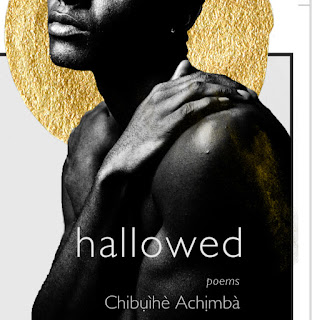We are caught by the cover photograph most especially, as it celebrates the male body, in a peaceful state.
1. Cover feel and texture : Matte, dull surface, non glossy feel.
2. Text design : 100 % balancing and organized fonting.
3. Art : The male body in black and white caught us all. It’s some victory extent. We hardly see male bodies as this on book covers. This may be part of a breakthrough that is yet to be adorned.
4. Layout balance : Shape of square in both horizontal and vertical formats.
5. Color Combination: Black, yellow, white.
6. Weather resilience: Might not survive rain or water at any point. It lacks gloss.
7. Ease of ownership : Light weight, heavy content. No large KG. Easy to carry around, in taxis and in buses. 30 paged.
8. Cover design by Caseyrenee Lopez
9. Cover pgotograph by Sam Burriss, via unsplash.com
10. Model, Daniel
9. Cover pgotograph by Sam Burriss, via unsplash.com
10. Model, Daniel
Praise for hallowed:
“In hallowed, Chibụìhè Achịmbà has carved out poems that are vulnerable and speak to the Queer experience in Nigeria. His voice is necessary and needed because like his poems, it is a thing of beauty, one that we need to remind us of the beauty that exists outside the ugliness of the struggle.”–Romeo Oriogun, author of The Origin of Butterflies
“the pain & potency of trauma in Achịmbà’s poems are delivered with a language so immediate, so intimate, they’re filled with an inheritance almost hereditary.”–JK Anowe, author of The Fracturing
“To read Chibụìhè Achịmbà’s hallowed is to see and to live through the pain of fragmentation and the anxiety of identity. Each poem in the collection is a feast of wondrous, elegant imageries. Written in language so pure and searing, this is a humane testament to the human predicament, the will to live, and to exist on one’s own terms.–Chimezie Chika
“It is such a gift to witness the work of such a wondrous poet as Chibụìhè Achịmbá, who presses into grief until it sings. hallowed brings tenderness and painful precision to the internal and external worlds of violence visited upon queer bodies—one poem declares: “i have a wound i call a country.” Yet, guilt is unfamiliar to the speaker, who loves and hurts for the sake of love. The voice brims with desire, and echoes long after you put down this book. Achịmbá writes: “lord i was something before you emptied me of language,” but these stunning poems are a masterwork of language.”–Logan February, author of Painted Blue with Salt Water


